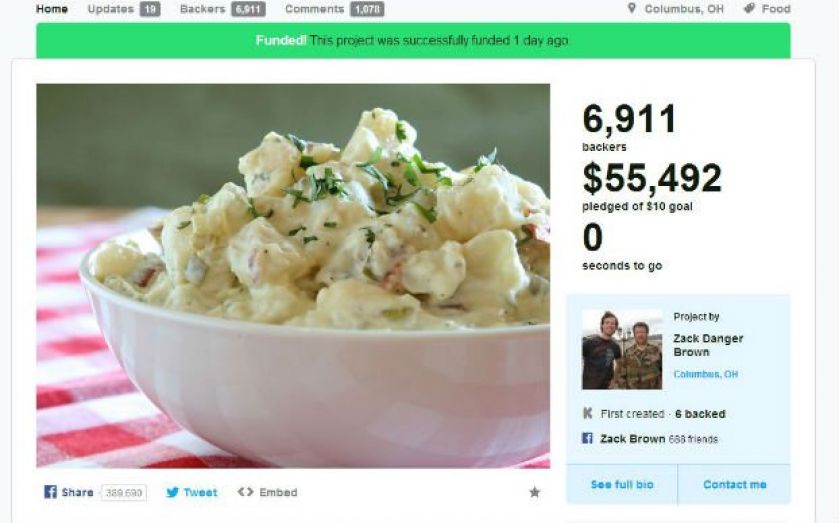Why did 7000 people just give $55,000 to a kickstarter project for potato salad?

It’s funded the Oculus virtual reality device and the Pebble watch, but now kickstarter has helped fund its most ambitious, if slightly surreal, project to date: potato salad.
Asking at least $1 for something which you can pick up for the princely sum of 35p at Tesco is probably more ambitious than asking people to fund an unknown new tech device, but one joker decided to give it a go- and he’s been surprisingly successful.
Zack Danger Brown, now also known as the potato salad guy, has attracted 6,911 backers each giving between $1 and $110 to make the dish, totalling $55,492.
Since launching the project on 3 July, saying “Basically I'm just making potato salad. I haven't decided what kind yet,” with a goal of just $10, the project has spiralled into the realms of internet legend.
Brown raised the target three times, the final time aiming for $3000 to fund a potato salad party to which he would “invite the whole internet”, smashing the target every time.
Even mayonnaise brand Hellmann's wanted in on it.
Hey @ztbrown! We're willing to donate ALL the mayo for your potato salad if you use @Hellmanns. Plus we have a chef in mind to help. YOU IN?
— Hellmann's Mayonnaise (@Hellmanns) July 7, 2014
While the majority of people splashed a spare dollar on the project to be part of the joke, for which they’ll get their name read out while Brown makes the potato salad, 21 people felt it was worthy of the full $110 (they receive a bite of the dish they helped create, a recipe book, hat and shirt), and more people gave between $35 and $50 than between $10 and $20.
Having hit the $55,000 mark, Brown said in addition to the potato salad party, a significant portion of the money will go towards funding hunger and homelessness charities.
While some called the wonderfully bizarre joke a crowdfunding crisis for kickstarter after recently expanding the type of projects that can appear on the site, Brown has said he thinks people are responding to “the opportunity to come together around something equal parts absurd and mundane.”
In a piece for CNBC, he wrote: “The biggest mistake that failed Kickstarter projects make is forgetting the crowd in crowdfunding. They forget to include people, to foster a community and to give back. They forget that, when you include your backers in the conversation, you get the opportunity to create something that you could have never created on your own.”